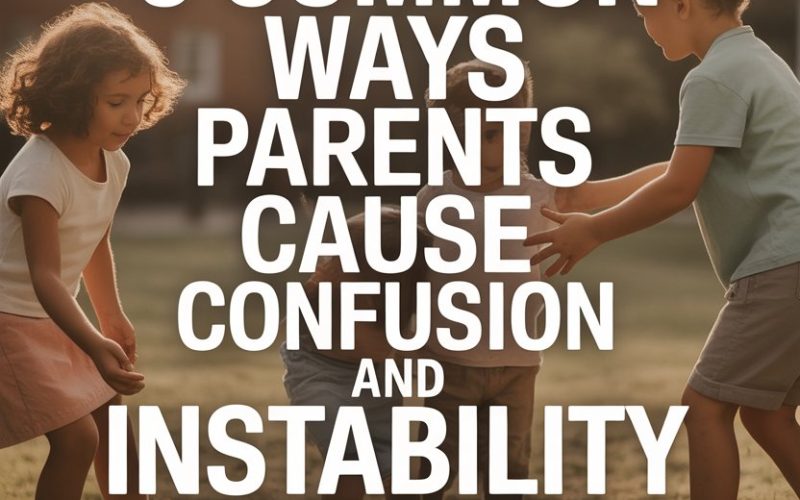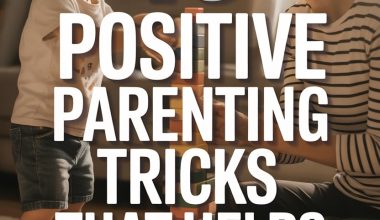Some days, parenting feels like starring in your own sitcom—one with sticky floors, missing socks, and plot twists involving nits.
While we all get things wrong sometimes (hand up, here), even the most devoted mums and dads can accidentally throw their kids for a loop.
If your little ones seem unsettled, a bit clingy, or forever testing boundaries, take a deep breath: You’re not alone, and you don’t need a child psychology degree to course-correct.
Here’s how parents unintentionally confuse their kids—and what you can do tonight to help them feel safe and steady again.
1. Mixed messages and reversals
Ever told your offspring, “No biscuits before tea,” only to hand them a custard cream when they look at you with those enormous eyes? Or barked, “Shoes off in the house,” then caught yourself padding across the carpet in trainers? Welcome to the club.
Mixed messages create a world where kids aren’t sure which rules matter and which ones are just for show.
Children, much like over-caffeinated detectives, notice everything—especially inconsistencies.
When the grown-ups send conflicting signals, little ones can become anxious or push limits just to see what today’s rules might be.
What helps: Try to stick to your guns with rules that matter (yes, that means resisting the sad puppy eyes—hard, I know). If you bend a rule, explain why.
Something like, “Usually no biscuits before tea, but we’ve had a tough day,” shows them it’s a special exception, not a moving target. Consistency breeds security.
Even if you only manage it 70% of the time, your child will start to relax into the boundaries.
2. Arguing in front of the kids
It’s a universal truth: Children seem to pick the very moment you’re about to lose your rag with your partner to ask, “What’s for pudding?”
Arguments happen in all families—try sharing a bathroom with teenagers and remain zen—but when grown-ups spar in front of the kids, it can shake their sense of safety.
Young minds are egocentric by nature; many believe everything is about them, including adult squabbles. Hearing raised voices or seeing slammed doors can leave kids anxious, even if the fight doesn’t involve them.
Research suggests that children exposed to frequent, unresolved conflict at home are more likely to develop issues with emotional regulation and anxiety, according to This study from University of Cambridge.
What helps: Take heated conversations behind closed doors as often as possible. If your child does witness a row, don’t leave them floundering.
Offer a simple explanation (“Mum and Dad disagreed, but we sorted it out”) and reassure them it wasn’t their fault.
Repair is powerful—let your children see you make up and talk through disagreements calmly, showing them it’s normal for people to resolve conflict without drama.
3. Changing routines on a whim
Routine is the unsung hero of childhood. Sure, it’s not glamorous—no one’s Instagramming the bedtime wind-down—but predictable patterns help kids feel safe.
When bedtime, meals, or school pick-up changes without warning, the world can feel a bit wobbly for your child.
Maybe you work shifts, or maybe life just throws you curve balls and you’re improvising on the fly. Sudden changes (like swapping who picks up from school or moving dinner by an hour) can leave kids feeling lost at sea.
What helps: Whenever possible, give your child a heads-up about changes, even if it’s as simple as, “Auntie Sarah’s picking you up today instead of me.”
For routines you control, keep them as steady as you can. If things need to change, talk through what’s happening.
A visual timetable, like a magnetic chart on the fridge, can give young children a sense of control and predictability. Kids love to know what’s coming next—even if it’s just bath time.
4. Over-promising and under-delivering
We’ve all been there: “Yes, we’ll go to the park after I’ve finished this email.” Three hours and two conference calls later, the park is closed and your child is staging a one-person protest in the lounge.
When promises fall through regularly, children start to doubt you mean what you say. Trust wobbles, and cues about what’s really important get lost.
This extends to things like, “If you tidy up, you can have extra screen time,” and then forgetting or getting distracted.
While it’s easy to underestimate how much these things matter, a broken promise can feel huge to a child—like being left at the altar, only with less cake.
What helps: Only promise what you know you can deliver (or at least what you’ll move heaven and earth to make happen). If you can’t keep a commitment, own up and apologise.
Something like, “I’m really sorry, I said we’d go to the park and I didn’t make it happen. Tomorrow, I’ll try again,” shows respect for their feelings.
Over time, your child will learn that your word is solid—and that grown-ups make mistakes but try to put them right.
5. Projecting grown-up worries
Newsflash: Kids are emotional sponges. If you’ve ever had a tiny voice ask, “Mum, are you worried about money?” after you muttered about bills, you know how quickly they pick up on your stress.
Sometimes, without meaning to, parents offload their anxieties about work, relationships, or the state of the world straight into their kids’ laps. It’s the emotional equivalent of handing them a bag you don’t want to carry.
Chronic stress in the family can leave children feeling insecure or responsible for things far beyond their years.
An American Psychological Association survey found that children whose parents reported high stress levels were more likely to feel stressed themselves and complain of headaches, tummy aches, or sleeplessness.
What helps: Try to keep big, grown-up worries out of little ears. When stress does spill over, be age-appropriately honest: “I’ve had a tough day at work, but it’s not your job to worry about it.”
If your child seems anxious, acknowledge their feelings without giving them the full gory details. And don’t forget to model how you manage stress—exercise, a cuppa, talking it out with friends—so they learn healthy ways to cope.
Building steadier ground tonight
Perfection isn’t a parenting requirement—thank goodness for that. Kids don’t need flawless mums or dads; they need steady ones who admit when they’ve stuffed up and try again.
Next time you catch yourself sending mixed messages or tossing out a promise you can’t keep, pause, regroup, and give your child that reassuring sense of “You can count on me.”
Hang up your superhero cape, make peace with the imperfect juggle, and trust that even small tweaks can bring calm to your child’s world.
And if all else fails? Cuddle on the sofa and read a book together.
Sometimes the best reassurance comes in the simplest moments.





